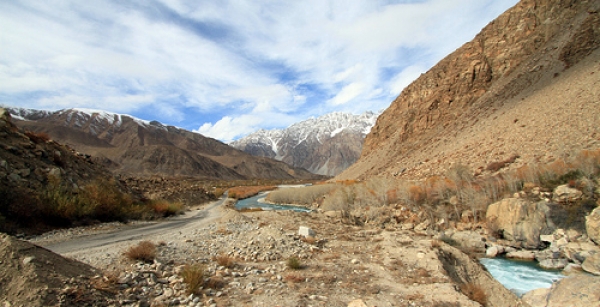Water Security in Central Asia: Rogun Dam and Human Rights
Construction on Tajikistan’s Rogun hydropower plant began in 1976; thirty-eight years later, the Rogun Dam is still unfinished. Part I of this series outlined the geopolitical ramifications of the dam’s construction centered on water-security and downstream Uzbekistan.
However, issues of financing and human security are also of imminent concern.
 When construction began, Tajikistan was a part of the Soviet Union; after the USSR’s dissolution in 1991, the Tajik government was unable to finance the operation by itself. Since then, funding for Rogun has been somewhat of an enigma. Cost estimates for work thus far, as well as completion, are as high as $6 billion USD. The Tajik government is unable to pay for this costly venture, thus they’ve had to secure funding from outside sources. Over the years, capital has been provided in limited capacities by the Russian government and the World Bank.
When construction began, Tajikistan was a part of the Soviet Union; after the USSR’s dissolution in 1991, the Tajik government was unable to finance the operation by itself. Since then, funding for Rogun has been somewhat of an enigma. Cost estimates for work thus far, as well as completion, are as high as $6 billion USD. The Tajik government is unable to pay for this costly venture, thus they’ve had to secure funding from outside sources. Over the years, capital has been provided in limited capacities by the Russian government and the World Bank.
At one point, the Tajik government even implored its own citizens to donate to the dam’s construction, with little success. Looking to the future, construction can only be completed with fluid access to funding, a conundrum for Tajik officials. However, in order to secure funding, the Tajik government will likely have to first address issues of human security.
In March 2013, Tajikistan’s Embassy to the U.S. released a document outlining Rogun’s influence in deterring terrorism. According to officials, the dam will create a sustainable energy source and allow for further economic development. The document goes on to argue that economic development will allow greater security in Tajikistan, a concern for many in the region as the U.S. pulls troops out of Afghanistan. However, it seems one international organization is more concerned with the government’s treatment of Tajik citizens than of rogue interstate actors.
In June 2014, Human Rights Watch (HRW) released a report detailing the plight of individuals displaced from the dam’s construction. Thousands of rural Tajiks have been relocated, creating a strain on everyday life in a country that already has widespread poverty. The report alleges human rights violations in the form of reduced land sizes for resettled families, limited access to farmable land, loss of viable employment, and deficit resources. Furthermore, HRW has encouraged funders to further analyze their relationship within the Tajik government. With strict scrutiny on financial endeavors and human rights issues, along with a current halt on construction, Rogun will likely not be completed anytime soon.
For more, read ASP’s recently released report, “Central Asia: Five Key Issues” outlining five critical issues that Central Asia currently faces, including climate change and its relation to water security.







[…] American Security Project here to read my latest article on Central Asian water […]